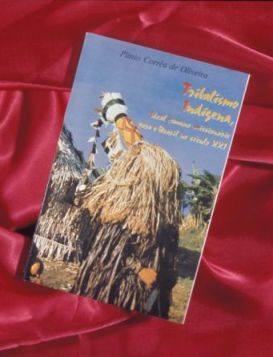|
Plinio Corręa de Oliveira
PART III Section XII “Independence or Death” Proclaimed in Brazil—Against Brazil
|
Indian Tribalism: The Communist-Missionary Ideal for Brazil in the Twenty-First Century |
|
Agitators among the clergy want to transform the historical cry of "Independence or Death" into a cry of revolt and separation of the Indians from the white landowners in order to later make it a motto of social revolution for workers against employers. All this appears in a climate where the concept of the Brazilian nation, united and thriving, is apparently fading (Cf. text no. 3). It is not clear how this Indian movement can reach its goals, exposing even the lives of its constituents, and at the same time refrain from using arms. Will it seek to bring about a peaceful insurrection in the style of Ghandi? 46. Indian Declaration of Independence From Brazil? Composition attributed to the Indian Txibae Ewororo and widely published in missionary magazines and Catholic publications in general: I am going to present to you the words of my brothers, of those called 'Indians.' I do not know if through ignorance, scorn, or simply to give something a name, but for many people we are merely a thing. These words are going to tell you the last part of the drama that we are living since the men of another race, another culture, and another world set foot on our lands. The White man, he who calls himself civilized, stepped heavily on the land as well as on the soul of my people and the rivers swelled and the seas became saltier because the tears of my people were many. I said that the words you are going to read are the narration of the end of a drama, but I do not know exactly how this drama is going to end. I only know that we are encouraged by a great hope and we are resolved to change the paths of our history. Whence comes this hope to us? Have the civilized become more human? No, unhappily, no! It is we who want to be treated as human beings and not as things. And how are we going to change the paths of history? Are we going to take up arms? Are we going to confront the whites as they confronted us? No, true Christians do not do this because this would be to equate themselves to the whites, and arms do not solve problems. Arms are the arguments of cowards. We do not want to imitate the whites in what they should be most ashamed of: the use of arms in order to kill their fellow creatures! We are going to unite, we are going to die if necessary, but we will no longer accept the imposition of the will of others. We are going to demand that everyone, from the government to our neighbor, treat us like free people, without depending on anyone. Did not the Brazilian people once say: 'Independence or Death'? We also are going to say this, not only in word but also in our attitude. When the Indian wants, he knows how to be independent. We prefer to die free and not to live as a slave. (Doc. 34, pp. 35-36) Commentary This reeks with subversion, being visibly written under missionary influence (the Indian to whom its authorship is attributed is a member of CIMI cf. "Bulletin of CIMI" Year IV, no. 22, July-August, 1975). It shows a categorical tendency to proclaim the independence of the Indians from Brazil. This document is subversive in the sense that it is separatist. Furthermore, for some time now, the Indian separatist movements have figured among the objectives of the international communist revolution, as one sees from the following document: 47. The Indian, Raw Material for Communist Agitation? Walter Kolarz of the BBC of London, a well-known specialist in communist matters stated: The Second Declaration of Havana raised the issue of' the Indians, the Mestizos, the Negros and the Mulattos in the hope of finding in these racial groups a powerful reserve army for the revolution. These racial questions were raised in the Declaration of Havana with special persistence, and the passages in consideration recall several statements on Latin America made by pre-war Communist International in which the Indian problem usually held an important place. Already in 1928, on the occasion of the 6th Congress of the Communist International, the parties of Latin America were instructed to develop a series of special measures regarding self-determination for the Indian tribes, special propaganda in the Indian languages, and special efforts for the conquest of key people among them. In reply to this general orientation, the Peruvian communists advocated the formation of the republics of Quechuan and Aymaran, and even the communist party of Chile demanded the creation of the republic of Arauco, though there were only a few thousand Araucan Indians in the southern part of the country. By 1950, the Mexican communists came out with the slogan: 'Autonomy in local and regional administration' for the Indian peoples. The assertions contained in the 'Declaration of Havana' notwithstanding, the communists were no more pro-Negro, pro-Indian than they were pro-Tibetan, pro-Guyanese, pro-Hungarian or pro any other people. Negroes, Mulattos, Indians, and Mestizos were destined simply to be used as sociological and political raw material to aid the Latin American communist parties' rise to power. (Doc. 35, p. 99) |
|

